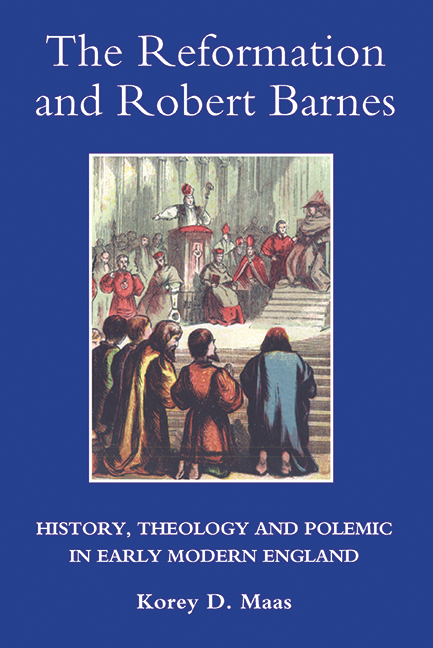Book contents
- Frontmatter
- Contents
- Dedication
- Acknowledgments
- Abbreviations and short titles
- Introduction
- Part I The Life and Theology of Robert Barnes
- 1 The Life of Robert Barnes
- 2 The Theology of Robert Barnes
- Part II Barnes's Programme: History, Theology, and Polemic
- Part III The Reception and Revision of Barnes's Programme
- Bibliography
- Index
- Miscellaneous Endmatter
2 - The Theology of Robert Barnes
from Part I - The Life and Theology of Robert Barnes
Published online by Cambridge University Press: 11 May 2017
- Frontmatter
- Contents
- Dedication
- Acknowledgments
- Abbreviations and short titles
- Introduction
- Part I The Life and Theology of Robert Barnes
- 1 The Life of Robert Barnes
- 2 The Theology of Robert Barnes
- Part II Barnes's Programme: History, Theology, and Polemic
- Part III The Reception and Revision of Barnes's Programme
- Bibliography
- Index
- Miscellaneous Endmatter
Summary
the On evidence of even a brief survey of his life, Robert Barnes is clearly seen to have been a proponent of the early modern evangelical movement. His commitment to this movement for the reform of the church is seen even more plainly when examining his theology proper, whether on the basis of his published works or of other extant evidence. The details of Barnes's biography also indicate that he was aligned especially with the Lutheran wing of reformation evangelicalism. And again, an examination of his theology bears this out. Not all have agreed that Barnes can be so easily categorised, however. Having already placed him in the history and geography of the early reformation, then, it is necessary to attempt to locate him theologically.
While his stance on every controversy of the day cannot here be examined, a brief look at three particular issues is warranted before moving on to address the subject of his overall historical and theological programme. A fresh appraisal of Barnes's positions with regard to the doctrine of justification, the theology of the eucharist, and the understanding of Royal Supremacy is desirable, in part, because each has been the subject of some dispute. More importantly, his stance on these issues is intimately related to his particular theological method, both influencing it and in turn being influenced by it.
The doctrine of justification
When Robert Barnes first came to public attention with his sermon of December 1525, his preaching gave little evidence of a programme going beyond a moral reform of the clergy. Indeed, later recounting the articles with which he was then charged, he noted that offences ‘agenst theyr abomynable lyvynge and damnable pompe and pryde be the moste parte of them all. Those ware the thynges / that I toke in honde to dystroye’. As he came increasingly under the influence of the Wittenberg reformers, however, Barnes's emphasis on ‘abominable living’ gradually gave way to more specifically doctrinal emphases. Unquestionably, of the many theological articles he would address in the final decade of his life, none was granted such consistent attention as that concerning the doctrine of justification. Not only does it receive its own heading in each of his topical dogmatic works, but in each of these it also comes first in the order of theological points addressed.
- Type
- Chapter
- Information
- The Reformation and Robert BarnesHistory, Theology and Polemic in Early Modern England, pp. 42 - 68Publisher: Boydell & BrewerPrint publication year: 2010

